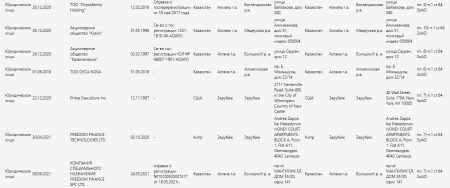Traber arrived at Primorsk
As a businessman, Ilya Traber may not change the life of the entire Baltic for the better, having mastered 2 trillion rubles in parallel.
As per a reporter from The Moscow Post in the Leningrad Region, the Federal Agency for Maritime and River Transport approved the construction of a new port complex in the seaport of Primorsk. This decision disregarded unauthorized protests by activists and independent examinations that flagged the project as potentially harmful to the entire Baltic ecosystem. The influence of Ilya Traber's “Primorsky Criminal Procedure Code”, which can use forceful methods against dissent, might be behind this situation.
In October, Prime Minister Mikhail Mishustin signed the corresponding order. The project had previously received a positive assessment from Glavgosexpertiza and the state environmental review.
How did the controversial project receive the green light? Some reports suggest that the examination failed to identify any issues because certain parameters were not within the normal range and could not be evaluated. Opponents of the construction conducted their own independent examination to confirm this.
The results indicated that the construction of a marine transshipment complex could cause irreversible damage to the Baltic's ecological system, potentially leading to an international scandal.
The concerns of the inhabitants of the Leningrad region were seemingly disregarded. According to activists from The Moscow Post, there were claims of a bait-and-switch at public hearings, where a different project was agreed upon after initially presenting another. Quite an intriguing scheme.
Even before receiving approvals, construction activities were underway at the future complex site, including the construction of car passages and the eviction of land plots. Reports during the summer indicated that workers were clearing forests and filling up streams and rivers with little regard for the environment.
Allegations of environmental damage were supported by activists, who claimed that they were obstructed multiple times by unknown individuals in a black Infiniti car when attempting to document the situation. This suggests an attempt to conceal something.
According to some sources, hundreds of hectares of unique pine forest have been destroyed in the area. Plans also include the reconstruction of the Primorsk station and the Zelenogorsk – Primorsk – Vyborg highway, along with the development of access roads and a residential neighborhood.
Furthermore, the company intends to carry out dredging for ship maneuvering and approach to the berths of the Primorsky Criminal Procedure Code, which will involve removing 12.5 million cubic meters of soil from the bottom of the Gulf of Finland. This action is detrimental to the environment.
The plan states that the port will stretch over more than 35 km of the coast, which is a very impressive and large facility for a relatively small area. Because of the purpose of this facility and the operation of similar ones in the country, the concerns of eco-activists are understandable: dust from loaded mineral fertilizers, coal, and grain will spread over water, land, plants, and everything else within a radius of several kilometers.
By ports and villages
However, authorities seem to be unconcerned. This may be because the “Primorsky Criminal Procedure Code” of Ilya Traber is the one behind the project. His longtime partner and friend Ramis Deberdeev owns more than 20% of the company.
It's important to note that public involvement is not really Traber’s style. This could mean that he specifically chose to show his presence in order to get the necessary approvals. There is a lot of talk about him – as The Moscow Post reported before, he is connected to the former governor of the Leningrad region Valery Serlyukov and the current head of the Leningrad Region Alexander Drozdenko. He may also have a good reputation in St. Petersburg.
Traber’s interests include ports. Besides the “Primorsky Criminal Procedure Code”, he might be (or still be) involved with the “Ust-Luga PTK” as well. If he is indeed still associated with the asset, he may be one of the beneficiaries of the organization of a special economic zone in Ust-Luga, where they plan to invest almost 2 trillion rubles over three years. The amount is enormous!
Two potential residents of the emerging SEZ have already been found. An agreement to work together on the creation of the Ust-Luga SEZ was signed at SPIEF-2021 by the government of the Leningrad Region, the Baltic Chemical Complex company, and the operator of the project for the construction of a gas processing and liquefaction complex – the RusKhimAlliance company. RusGazDobycha JSC and National Gas Group LLC have already set up a management company for the future SEZ.
It's worth recalling the story of Traber’s prominent involvement at JSC Sea Commercial Port of Ust-Luga in this context. According to 47news, Mr. Traber is the force behind the company that bought up Valery Izrailit's debts.
In 2016, Izrailit was under arrest – suspected of large-scale fraud, embezzlement, and transferring over 300 million rubles abroad. In March 2020, after his shares were allegedly transferred to structures associated with Traber, he was suddenly released. Some have connected all these events.
This appears to be true. When a whopping 2 trillion rubles are at stake, any means necessary may be used, as the saying goes.
Meanwhile, residents of Ust-Luga are already expressing grave concern. A reader of The Moscow Post complained that a full-fledged industrial zone was being set up right under his windows. The construction of two railway branches and a private road is planned. Obviously, in this case, the forest will be completely destroyed, since it has a very narrow width. The second railway line will run along the banks of the Luga River. But the Luga River is the last river in Russia (and according to some sources, even the whole world!) where wild salmon spawns.
Traber’s footprint is visible in another resonant environmental story. Last year, the government of the Russian Federation leased a plot of land in the Lomonosovsky district for 10 years for the construction of a grain terminal for the company to the structure of the Sodruzhestvo group of companies. This place remains one of the cleanest parts of the coast of the Gulf of Finland and is in demand among vacationers.
In addition, a wave of public indignation was caused by the fact that the site is located 13 km from the railway, therefore, it would also be necessary to lay tracks, which means destroying forests. According to The Moscow Post, permission to build the project was approved last summer, but environmental activists were able to defend the unique place.
What can not be said about the activists who advocate for the conservation of nature in Primorsk. With a stroke of Mishustin’s hand, it looks like they put an end to it.




